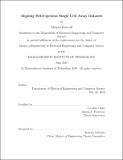| dc.contributor.advisor | Caroline Uhler. | en_US |
| dc.contributor.author | Katcoff, Abigail. | en_US |
| dc.contributor.other | Massachusetts Institute of Technology. Department of Electrical Engineering and Computer Science. | en_US |
| dc.date.accessioned | 2019-11-22T00:03:17Z | |
| dc.date.available | 2019-11-22T00:03:17Z | |
| dc.date.copyright | 2019 | en_US |
| dc.date.issued | 2019 | en_US |
| dc.identifier.uri | https://hdl.handle.net/1721.1/123030 | |
| dc.description | This electronic version was submitted by the student author. The certified thesis is available in the Institute Archives and Special Collections. | en_US |
| dc.description | Thesis: M. Eng., Massachusetts Institute of Technology, Department of Electrical Engineering and Computer Science, 2019 | en_US |
| dc.description | Cataloged from student-submitted PDF version of thesis. | en_US |
| dc.description | Includes bibliographical references (pages 51-53). | en_US |
| dc.description.abstract | Pluripotent stem cells offer strong promise for regenerative medicine but the pluripotent cell state is poorly understood. The goal of this thesis is the development of methods to analyze how the multiple facets of cell state-including gene expression, chromosome contacts, and chromatin accessibility-relate in the context of stem cells. The variability of each of these characteristics cannot be deduced from population studies, and while recent advances in single-cell transcriptomics have led to the development of a number of different single-cell assays, datasets that collect multiple types of assays on the same cells are rare. In this thesis, we explore the ability of three methods to integrate datasets from different single-cell assays based on an existing paired single-cell dataset of ATAC-seq and RNA-seq for human A549 cells. We then apply these methods to map the variability between three single-cell datasets-ATAC-seq, RNA-seq, and Hi-C-on pluripotent mouse embryonic stem cells and assess the performance of these methods. | en_US |
| dc.description.statementofresponsibility | by Abigail Katcoff. | en_US |
| dc.format.extent | 53 pages | en_US |
| dc.language.iso | eng | en_US |
| dc.publisher | Massachusetts Institute of Technology | en_US |
| dc.rights | MIT theses are protected by copyright. They may be viewed, downloaded, or printed from this source but further reproduction or distribution in any format is prohibited without written permission. | en_US |
| dc.rights.uri | http://dspace.mit.edu/handle/1721.1/7582 | en_US |
| dc.subject | Electrical Engineering and Computer Science. | en_US |
| dc.title | Aligning heterogenous single cell assay datasets | en_US |
| dc.type | Thesis | en_US |
| dc.description.degree | M. Eng. | en_US |
| dc.contributor.department | Massachusetts Institute of Technology. Department of Electrical Engineering and Computer Science | en_US |
| dc.identifier.oclc | 1127649665 | en_US |
| dc.description.collection | M.Eng. Massachusetts Institute of Technology, Department of Electrical Engineering and Computer Science | en_US |
| dspace.imported | 2019-11-22T00:03:16Z | en_US |
| mit.thesis.degree | Master | en_US |
| mit.thesis.department | EECS | en_US |
